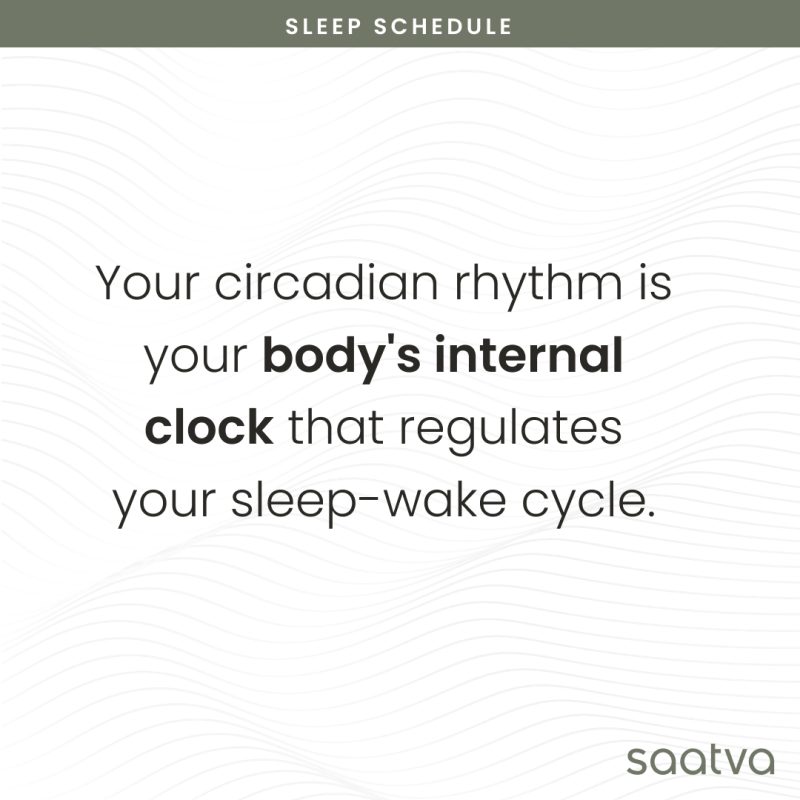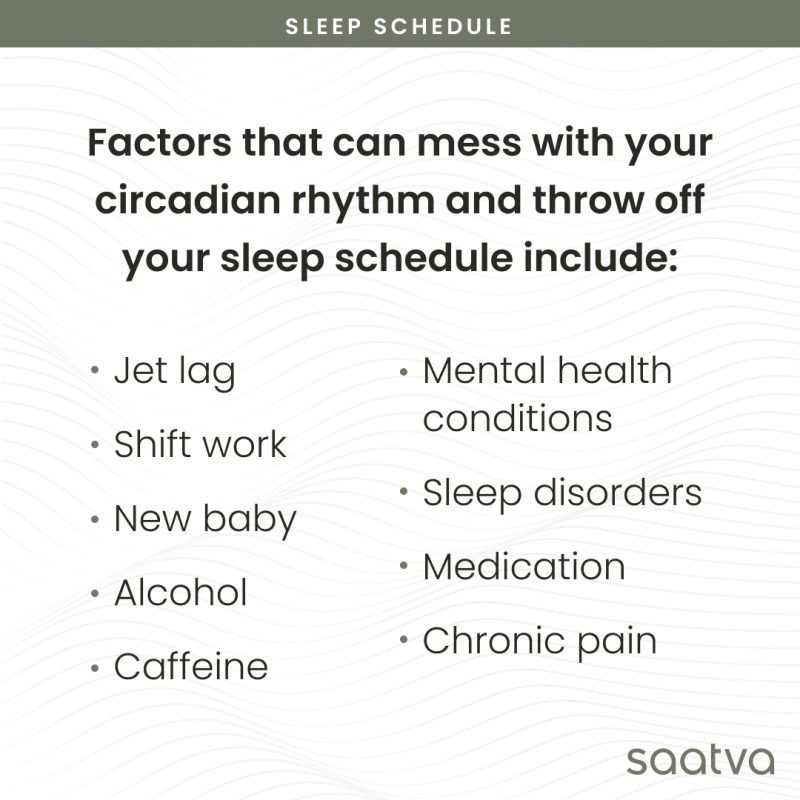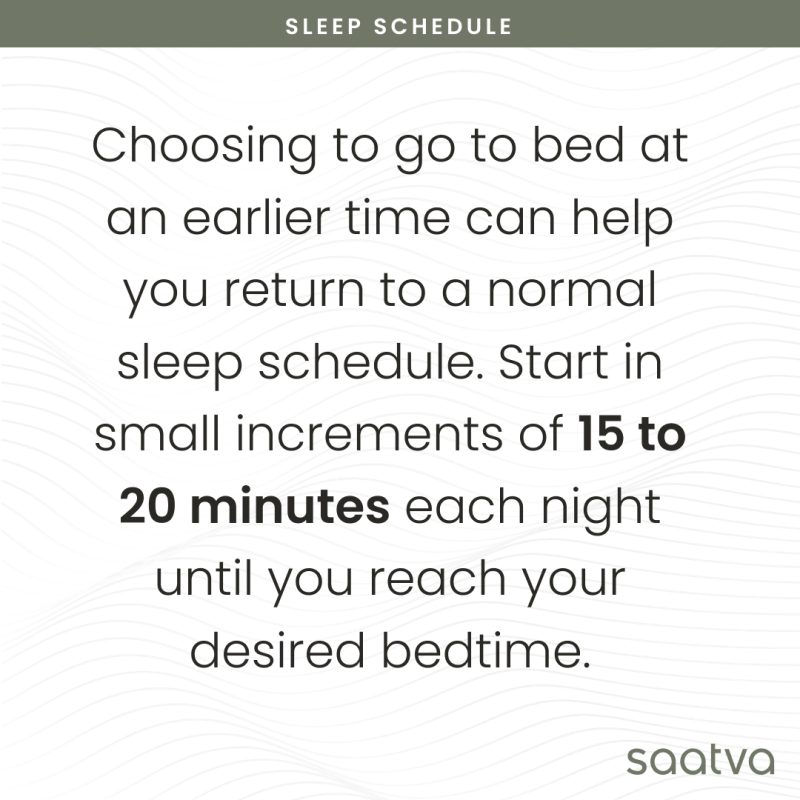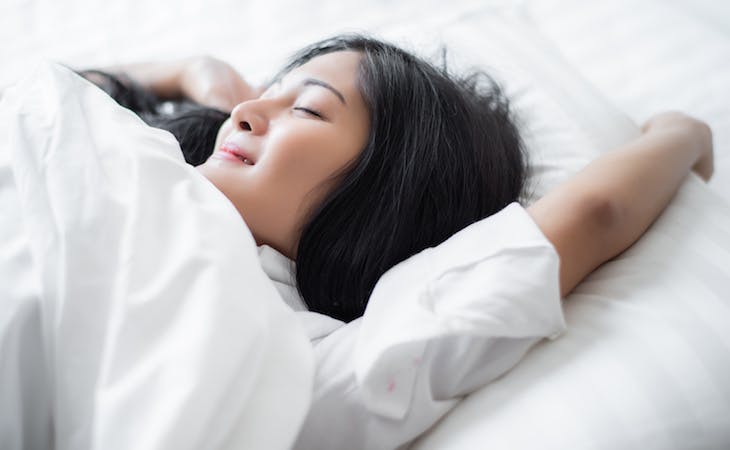Life can always be counted on to throw a monkey wrench into your sleep. From doing shift work to traveling across time zones, numerous variables can throw off your internal body clock, which then impacts your sleep. As a result, you may have difficulty falling asleep, staying asleep, or both.
Fortunately, you don’t have to suffer forever, but getting your sleep schedule back on track will take some work. Here’s how to do it.

How your internal sleep clock works
Your body doesn’t do anything accidentally. Everything is on a schedule, something you can thank your circadian rhythm for.
“It functions like a time-keeping device that allows your brain to schedule activities,” says W. Christopher Winter, MD, president of Charlottesville Neurology and Sleep Medicine and author of The Sleep Solution.
Part of that includes your sleep clock, which operates on a roughly 24-hour rhythm, and it’s impacted by so-called time clues called zeitgebers. [1]
“They make sure the clock adjusts each day to the light-dark cycle so you’ll be awake when it’s light and asleep when it’s dark,” says Roy Raymann, PhD, owner and founder of Sleep Czar. The main zeitgeber is light, but others include temperature, social interaction, meal intake, exercise, medication, and atmospheric condition. [1]
One job of the sleep clock is to release the hormone melatonin during the evening. “Melatonin starts a cascade of bodily events that prepares you for sleep,” Raymann says.
Although the exact timing is different for everybody—morning people will generally have an earlier release while night owls will have a later release—your body releases it at about the same time every night. [2, 3]
Then when your body is exposed to bright light the next day, the release of melatonin stops. [3, 4] The light acts as a zeitgeber, signaling to the clock that it’s daytime and thus, interrupting the process of preparing for sleep. [4]
That’s why when you interrupt that clock, your sleep gets messed up. With travel and shift work, sleep is impacted mainly because of the mismatch in light output, Raymann says. In other words, the clock expects you to sleep when it’s dark. [5]
Meanwhile, insomnia or several nights of bad sleep affects your slumber in another way. [6]
“By not reducing sleep pressure (a process that makes your brain feel sleepy and more pressured to want sleep the more you’re awake) sufficiently overnight, you might feel the need to catch up with sleep during the day, which then might affect sleep at night,” says Raymann. [7]

Factors that can impact your sleep schedule
There are numerous internal and external elements that can influence this sleep schedule. Let’s review a few of those factors:
External factors
Jet lag
Traveling can significantly affect your sleep cycle, especially if you’re a frequent traveler. One common issue is jet lag, which happens when you quickly travel across several time zones. [8]
Your body clock is out of alignment with your destination time zone, especially if you are traveling to a time zone where the timing of night and day is drastically different.
Irregular schedule
Whether you’re a student studying into the wee hours of the morning or you work at odd hours during the week, this inconsistent wake and sleep schedule can interrupt your body’s natural ability to fall asleep at night and wake up during the day.
BMC Public Health published a study that focused on 160 undergraduate students in Taiwan, which found that those with irregular sleep schedules experienced a decrease in sleep duration and lower overall sleep quality. [9]
Becoming a parent
Bringing a child into the world can be one of life’s greatest joys. However, it’s not surprising that your bundle of joy can impact your sleep schedule.
In fact, a study published in the journal Sleep showed that parents don’t return to their normal sleep routines until six years after the child is born; for mothers, it can be even longer. [10]
Drinking alcohol or smoking
Sipping a nightcap or smoking a cigarette is often part of someone’s nightly routine, these habits can disrupt your sleep schedule.
Alcohol consumption can alter your circadian rhythms, affecting both when you fall asleep and the quality of your sleep. [11] Additionally, the stimulating factors of nicotine may delay when you fall asleep. [12]
Caffeine
If you happen to have a cup of black tea at night or even top off a meal with a cup of coffee, you may be affecting your desire to go to bed.
A study published by the Journal of Clinical Sleep Medicine showed that having some form of caffeine, whether it’s coffee, soda, or tea, even up to six hours before bedtime can keep you awake for longer. [13]
Internal factors
Mental health
Whether you’re dealing with stress, anxiety, or depression, your mental health can influence your sleep schedule. In a study in the International Journal of Caring Sciences, researchers found that students who worried about their income rate had poorer sleep quality than those who had higher incomes. [14]
This suggests that if you’re dealing with financial stress, the anxiety surrounding this concern can affect your ability to maintain a normal sleep schedule.
Sleep disorders
Sleep conditions, such as sleep apnea or insomnia, can negatively impact your sleep cycle, and as a result, your overall sleep schedule. Both conditions can cause you to wake up periodically through the night, disrupting your natural sleep-wake timing.
Not only is your nighttime schedule affected, but this can lead to excessive daytime fatigue, potentially causing you to fall asleep during the day. [15]
Physical pain or injuries
If you’ve been injured or struggle with a physical condition that causes chronic pain, you may have difficulty falling asleep.
It can make it more difficult to fall asleep at night and create more interruptions during your sleep cycle. [16] As a result, you may experience more fatigue during the day.
Medication
Many medications can have side effects that can affect your regular sleep schedule. [17]
From over-the-counter medications like antihistamines, often used to treat allergy symptoms, to antidepressants, taking these regularly can have side effects that cause daytime drowsiness or interrupt your sleep cycle. [17, 18]

8 ways to reset your sleep schedule
Resetting your sleep schedule after you’ve been traveling, working the night shift, or sleeping poorly is possible, but it’ll take time. How much time will depend on how far off your schedule you’ve gotten, Raymann says.
Start with travel. “As a general rule, allow your body day to adjust for each time zone you travel,” Winter says. The more time zones you’ve crossed, the harder and longer it will take your body to adjust.
That’s not the same with shift work as many variables play into this, which could make your recovery longer. And recovering from several nights of bad sleep may happen once you take a nap or sleep in over the weekend, Winter says.
To help your body adjust, put those zeitgebers to work.
1. Adjust the lights in your home
Start by dimming the lights in your house at night, even replacing lightbulbs in the rooms you frequent with ones that don’t have blue or green lights, Winter says. (Learn more about the effects of blue light on sleep.)
2. Cool down the temperature before bed
To regulate that temperature, which naturally dips at night and rises in the morning, take a hot bath before bed (you’ll then cool off when drying off) and consider buying a pad for your bed that will cool you at night and warm you in the morning. [19]
You can even program your thermostat to continue dropping a few degrees every few hours after dinner. (Discover what revenge bedtime procrastination is and how to stop it.)
3. Exercise for better sleep
Also, get into the habit of exercising, opting for an activity that warms you up. If possible, plan that exercise session for the morning, especially if you can get outside, which will wake up your body, Winter says. (Follow this early morning workout routine for better sleep.)
Even if you’re not exercising, get outside to see the light, which will cue your body to stop melatonin production, Winter says. Sit on your porch to eat breakfast, sip your morning coffee outside, or take your dog for a walk in the morning. Artificial light therapy can be effective too. [20]
4. Adjust your bedtime
Making the change to go to bed at an earlier time can help you return to a normal sleep schedule. However, this may not be an easy change to make right away. You may consider starting in small increments of 15 to 20 minutes sooner than your normal time frame. [21]
It’s also important to prepare your mind frame for bedtime as well, making sure you are avoiding electronics, cutting out any caffeinated beverages six hours ahead of time, and starting your bedtime routine sooner as well. [22, 23]
5. Avoid naps
There are numerous benefits of taking a nap, from restoring your energy to improving your mood. [24] However, taking one too soon before bedtime or taking a nap longer than 20 minutes can harm your ability to feel tired enough to go to bed and fall asleep with ease.[24]
According to the Mayo Clinic, avoid taking a nap later than 3 pm and limit it to only about 20 minutes and no more than 30 minutes. [24]
6. Watch what you eat and drink before bed
The foods you eat and the beverages you drink can have an impact on your sleep schedule. It’s no surprise that drinking caffeinated beverages can keep you up if enjoyed before bed; however, you should also avoid it at least six hours before scheduled bedtime, research says. [22] Additionally, limit—or avoid completely—any alcoholic beverages, which can lead to poor quality of sleep. [25]
What’s more, certain foods, like spicy dishes or high-fat or high-protein choices, can be more difficult for your body to digest. If you can’t resist, make sure you have your meal at least three hours before bedtime so your body has time to adjust. [26] If you’re having a late meal, opt for a smaller meal of fruit, nuts, or whole grains like oats or rice.
7. Limit screen time before bed
If you have a habit of looking at social media, checking the news, or even reading an ebook on your phone right before bed, the light of your phone can delay your sleep cycle.
Studies have shown that being exposed to the light of electronics can disrupt your sleep pattern. [27] Put your devices away at least an hour before bed or at least wear blue-light glasses to minimize its effect. [28, 29]
8. Try meditation or therapy to address anxiety
Incorporating a meditation habit before bed can help you overcome any sleep-related anxiety you are experiencing. [23] About an hour before you plan to go to bed, begin winding down for the night, turning off any electronic devices, such as your smartphone, computer, or television. [28]
You may consider trying certain meditative techniques like 4-7-8 breathing exercises (breathe in four seconds, hold your breath for seven seconds, and exhale for eight seconds) or listening to deep slumber meditation. [30]
Additionally, research has shown that therapy can help you address chronic sleeping conditions, such as insomnia. [31] Overcoming the anxiety related to not being able to fall asleep can actually help you fall asleep faster and stay asleep for longer. Make sure you’re visiting a therapist who specializes in sleep anxiety or disorders for proper treatment.
When should you see a doctor?
If you’ve tried these at-home solutions for several weeks and are still having trouble adjusting your sleep schedule, then consider visiting your physician to see if there’s an underlying cause.
You may have a sleep disorder or mental health condition getting in the way of you adjusting your sleep schedule. Even certain physical conditions can impact your sleep cycle. [32]
FAQs
What’s the easiest way to reset your sleep schedule?
One of the easiest ways of adjusting your sleep schedule is to begin slowly. Make small adjustments planning to go to bed 15 to 20 minutes sooner than normal until gradually reach your desired bedtime.
Also, cut out any electronic devices and be mindful of your food and beverage choices before bedtime.
How do I get my sleep pattern back on track?
To get your sleep pattern back on track, stay committed to going to bed and waking up at consistent times during the week. This can be difficult if you have an irregular work or school schedule; however, try to maintain a consistent schedule as much as possible.
If you have to go to bed at odd hours, make sure your room remains dark and cool, so you’re creating the optimal sleep environment.
Still having trouble sleeping? Try these nighttime activities to help you relax.
References
- Reddy S, Reddy V, Sharma S. Physiology, Circadian Rhythm. [Updated 2023 May 1]. In: StatPearls [Internet]. Treasure Island (FL): StatPearls Publishing; 2024 Jan-. https://www.ncbi.nlm.nih.gov/books/NBK519507/
- Fowler, S., Hoedt, E. C., Talley, N. J., Keely, S., & Burns, G. L. (2022). Circadian Rhythms and Melatonin Metabolism in Patients With Disorders of Gut-Brain Interactions. Frontiers in Neuroscience, 16, 825246. https://doi.org/10.3389/fnins.2022.825246
- Burgess, H. J., & Eastman, C. I. (2004). Early versus late bedtimes phase shift the human dim light melatonin rhythm despite a fixed morning lights on time. Neuroscience Letters, 356(2), 115. https://doi.org/10.1016/j.neulet.2003.11.032
- Cleveland Clinic. Melatonin. https://my.clevelandclinic.org/health/articles/23411-melatonin
- Cleveland Clinic. Shift Work Sleep Disorder (SWSD). https://my.clevelandclinic.org/health/diseases/12146-shift-work-sleep-disorder
- Mayo Clinic. Insomnia. https://www.mayoclinic.org/diseases-conditions/insomnia/symptoms-causes/syc-20355167
- Centers for Disease Control and Prevention (CDC). Sleep Pressure: Homeostatic Sleep Drive. https://www.cdc.gov/niosh/work-hour-training-for-nurses/longhours/mod2/11.html
- Fowler, P. M., Bender, A. M., Stevens, D., Sullivan, K. O., K. Fullagar, H. H., Alonso, M., Biggins, M., Claassen-Smithers, A., Collins, R., Dohi, M., Driller, M. W., Dunican, I. C., Gupta, L., Halson, S. L., Lastella, M., Miles, K. H., Nedelec, M., Page, T., Roach, G.,... Botha, T. (2021). Managing Travel Fatigue and Jet Lag in Athletes: A Review and Consensus Statement. Sports Medicine (Auckland, N.z.), 51(10), 2029-2050. https://doi.org/10.1007/s40279-021-01502-0
- Kang, H., & Chen, C. (2009). Effects of an irregular bedtime schedule on sleep quality, daytime sleepiness, and fatigue among university students in Taiwan. BMC Public Health, 9, 248. https://doi.org/10.1186/1471-2458-9-248
- Richter, D., Krämer, M. D., Tang, N. K., E, H., & Lemola, S. (2019). Long-term effects of pregnancy and childbirth on sleep satisfaction and duration of first-time and experienced mothers and fathers. Sleep, 42(4). https://doi.org/10.1093/sleep/zsz015
- Meyrel, M., Rolland, B., & Geoffroy, P. A. (2020). Alterations in circadian rhythms following alcohol use: A systematic review. Progress in Neuro-Psychopharmacology and Biological Psychiatry, 99, 109831. https://doi.org/10.1016/j.pnpbp.2019.109831
- Singh, N., Wanjari, A., & Sinha, A. H. (2023). Effects of Nicotine on the Central Nervous System and Sleep Quality in Relation to Other Stimulants: A Narrative Review. Cureus, 15(11). https://doi.org/10.7759/cureus.49162
- Drake, C., Roehrs, T., Shambroom, J., Roth, T. (2013). Journal of Clinical Sleep Medicine. Caffeine Effects on Sleep Taken 0, 3, or 6 Hours before Going to Bed, 9(11). https://doi.org/10.5664/jcsm.3170
- Yildirim, S., Beycan Ekitli, G., Onder, N., Gaye Avci, A. (2020). Examination of Sleep Quality and Factors Affecting Sleep Quality of a Group of University Students. International Journal of Caring Sciences, 13(2). https://www.internationaljournalofcaringsciences.org/docs/69_1_serapyildirim_original_13_2.pdf
- Basunia, M., Fahmy, S. A., Schmidt, F., Agu, C., Bhattarai, B., Oke, V., Enriquez, D., & Quist, J. (2016). Relationship of symptoms with sleep-stage abnormalities in obstructive sleep apnea-hypopnea syndrome. Journal of Community Hospital Internal Medicine Perspectives, 6(4). https://doi.org/10.3402/jchimp.v6.32170
- Kelly, G. A., Blake, C., Power, C. K., O’keeffe, D., & Fullen, B. M. (2011). The association between chronic low back pain and sleep: a systematic review. The Clinical journal of pain, 27(2), 169–181. https://doi.org/10.1097/AJP.0b013e3181f3bdd5
- Harvard Health. Are your medications keeping you up at night? https://www.health.harvard.edu/diseases-and-conditions/are-your-medications-keeping-you-up-at-night
- Mayo Clinic. Is it OK to use over-the-counter antihistamines to treat insomnia? I’d like to avoid prescription sleep aids. https://www.mayoclinic.org/healthy-lifestyle/adult-health/expert-answers/sleep-aids/faq-20058393
- Haghayegh, S., Khoshnevis, S., Smolensky, M. H., Diller, K. R., & Castriotta, R. J. (2019). Before-bedtime passive body heating by warm shower or bath to improve sleep: A systematic review and meta-analysis. Sleep Medicine Reviews, 46, 124-135. https://doi.org/10.1016/j.smrv.2019.04.008
- National Heart, Lung, and Blood Institute. Circadian Rhythm Disorders Treatment. https://www.nhlbi.nih.gov/health/circadian-rhythm-disorders/treatment
- Cleveland Clinic. Good News: You Can Make Up for Lost Sleep Over the Weekend (Kind Of). https://health.clevelandclinic.org/insomnia-can-you-make-up-for-lost-sleep-on-weekends
- Drake, C., Roehrs, T., Shambroom, J., & Roth, T. Caffeine Effects on Sleep Taken 0, 3, or 6 Hours before Going to Bed. Journal of Clinical Sleep Medicine : JCSM : Official Publication of the American Academy of Sleep Medicine, 9(11), 1195-1200. https://doi.org/10.5664/jcsm.3170
- Mayo Clinic. Sleep tips: 6 steps to better sleep. https://www.mayoclinic.org/healthy-lifestyle/adult-health/in-depth/sleep/art-20048379
- Mayo Clinic. Napping: Do’s and don’ts for healthy adults. https://www.mayoclinic.org/healthy-lifestyle/adult-health/in-depth/napping/art-20048319
- Colrain, I. M., Nicholas, C. L., & Baker, F. C. (2014). Alcohol and the Sleeping Brain. Handbook of Clinical Neurology, 125, 415. https://doi.org/10.1016/B978-0-444-62619-6.00024-0
- Johns Hopkins Medicine. Better Sleep: 3 Simple Diet Tweaks. https://www.hopkinsmedicine.org/health/wellness-and-prevention/better-sleep-3-simple-diet-tweaks
- Silvani, M. I., Werder, R., & Perret, C. (2022). The influence of blue light on sleep, performance and wellbeing in young adults: A systematic review. Frontiers in Physiology, 13. https://doi.org/10.3389/fphys.2022.943108
- Cleveland Clinic. Why You Should Ditch Your Phone Before Bed. https://health.clevelandclinic.org/put-the-phone-away-3-reasons-why-looking-at-it-before-bed-is-a-bad-habit
- Hester, L., Dang, D., Barker, C. J., Heath, M., Mesiya, S., Tienabeso, T., & Watson, K. (2021). Evening wear of blue-blocking glasses for sleep and mood disorders: a systematic review. Chronobiology international, 38(10), 1375–1383. https://doi.org/10.1080/07420528.2021.1930029
- Cleveland Clinic. How To Do the 4-7-8 Breathing Exercise. https://health.clevelandclinic.org/4-7-8-breathing
- National Heart, Lung, and Blood Institute. Sleep Disorder Treatments. https://www.nhlbi.nih.gov/health/sleep-disorder-treatments
- National Institute of Child Health and Human Development. Are there medical conditions that may disrupt sleep patterns? https://www.nichd.nih.gov/health/topics/sleep/conditioninfo/sleep-disruption






